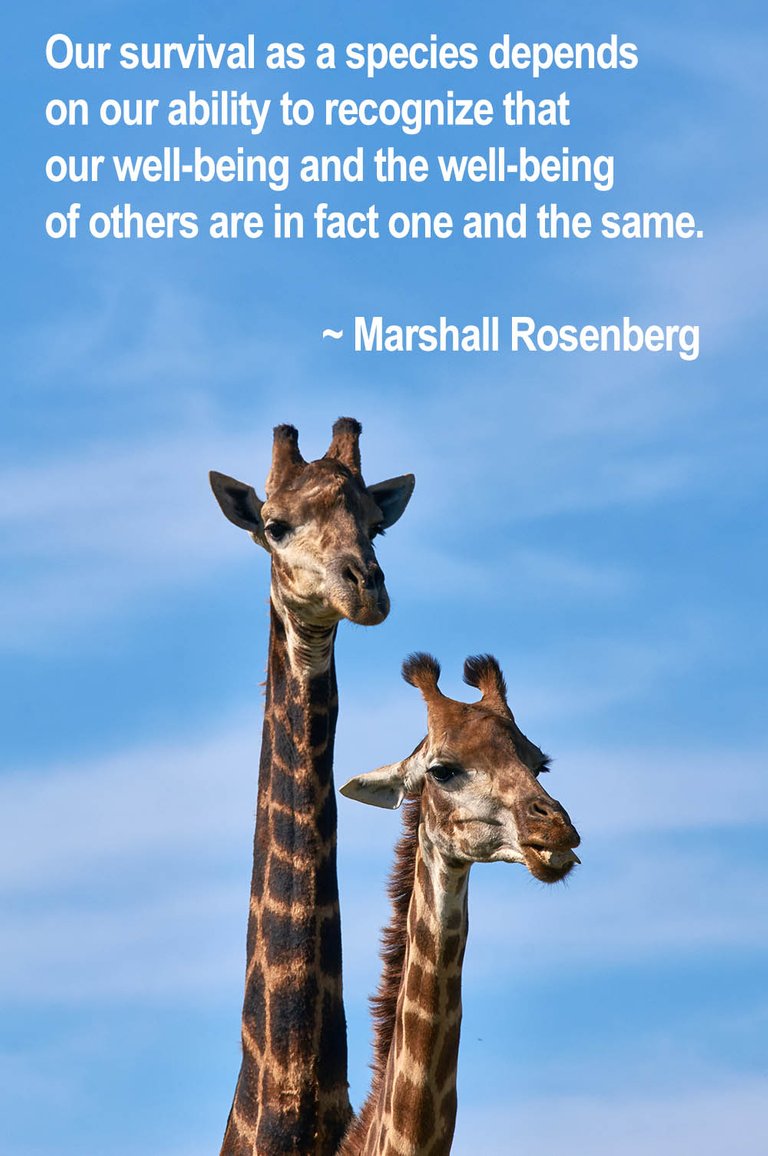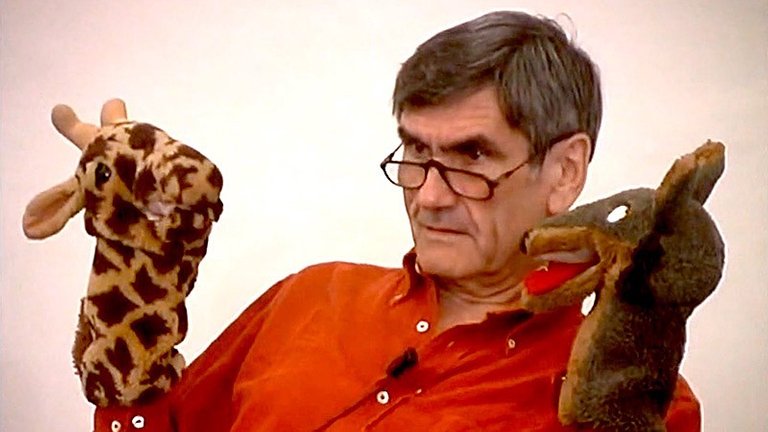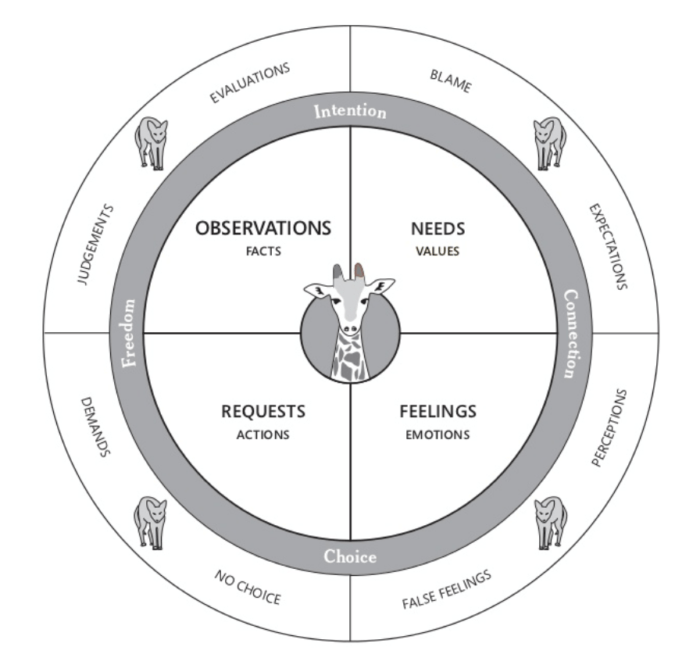Non-Violent Communication // Comunicação Não-Violenta
Not long ago I had a chance conversation with a good friend I knew about some therapies and psychological education methods that can generate good results (given that much of what we see around, at least here in Brazil, are very, very shallow, bland, lukewarm and inefficient therapies) and he introduced me to the concept of "Nonviolent Communication", a translation that at first glance seems extremely simplistic and even smacks of coaching or cheap book psychology. But no. I venture to say that it is one of the most important lines of knowledge that I have come to know in the last three and four years of my life. Compassionate communication (as it can also be called) is nothing more than a hyperlucid look at the way we communicate, on a literal auditory, cognitive, and expressive level. It is the re-learning to talk, to communicate on ALL levels. The most amazing thing about this is that, nonviolent communication is not like a new habit you have to fit into your life, but rather a filter, a new plugin that overlays all the layers of your relationship with the world, and automatically when you view reality through this "plugin" you not only communicate more efficiently and with much less trouble, but also understand what the other is talking about much more clearly.

Source
The man behind the concept is named Marshall Bertram Rosenberg and Rosemberg, a trained psychologist spent part of the 60s and 70s working in schools and universities to educate children to understand a way of dealing with others, in the midst of the boiling boil of blatant racial segregation (which never ended, but had moments of intense spotlight when the joining of ethnicities was finally "normalized"). Rosemberg had been doing an amazing job of social and personal education in all these years, forming support networks and spreading the concept to the four corners of the spherical world. Such a system continues to spread like a virus of good even though Marshall has sadly passed away (in 2015). Before his death he had been working in conflict and war zones such as Croatia and Serbia.

Source

Source
My plan here is not to go into depth about the techniques of nonviolent communication, not least because I am still beginning my studies in it, but to say that it exists, and that it will certainly make a big difference in your life if it is taken seriously. From your first words in the morning with the person you live with, to your boss or employee, to the homeless person, to your neighbor, to your children, everyone, you can define how precise your requests, anxieties, needs, fears, desires are, and to prove what I mean, I just have to put here an excerpt from one of his seminars, in a few minutes Marshall proves his point without any effort, but my suggestion is that you watch the whole video! It can make a difference to you! Thanks for reading!
Source

Source
Articles used for this search: 1, 2 and 3

Português
Há pouco tempo tive uma fortuita conversa com um bom amigo que conheci a respeito de algumas terapias e métodos de educação psicológica que podem gerar bons resultados (dado que muito do que se vê por aí, ao menos aqui no Brasil, são terapias muito, muito rasas, brandas, mornas e ineficientes) e ele me apresentou o conceito da "Comunicação Não-Violenta", uma tradução que num primeiro olhar parece extremamente simplória e até mesmo cheira à papinho de coaching ou de psicologia de livros baratos. Mas não. Arrisco dizer que é uma das linhas de conhecimento mais importantes que conheci nesses trinca e quatro anos de vida. A comunicação compassiva (como também pode ser chamada) nada mais é do que um olhar hiperlúcido para o modo como nos comunicamos, num nível literalmente auditivo, cognitivo e de expressão. É o re-aprender a conversar, se comunicar em TODOS os níveis. O mais incrível disso é que, a comunicação não-violenta não é como um novo hábito que você tem de encaixar em sua vida, mas sim um filtro, um novo plugin que sobrepaira todas as camadas do seu relacionamento com o mundo, e automaticamente quando se visualiza a realidade através desse "plugin" você não apenas se comunica mais eficientemente e com muito menos problemas, mas também compreende o que o outro fala de forma muito mais clara.

Source
O homem por trás do conceito se chama Marshall Bertram Rosenberg e Rosemberg, psicólogo formado passou parte das décadas de 60 e 70 trabalhando em escolas e universidades para educar as crianças a compreenderem um modo de lidarem com o próximo, em plena ebulição da segregação racial escancarada (que nunca acabou, mas teve momentos de holofote intenso quando enfim "normalizou-se" a junção de etnias). Rosemberg vinha fazendo um trabalho espantoso de educação social e pessoal em todos esses anos, formando redes de apoio e espalhando o conceito aos quatro cantos do mundo esférico. Tal sistema continua a se espalhar como um virus do bem ainda que infelizmente Marshall já tenha falecido (em 2015). Antes de sua morte ele vinha trabalhando em zonas de conflito e guerra como Croácia e Sérvia.

Source

Source
Meu plano aqui não é aprofundar sobre as técnicas da comunicação não-violenta, até porque estou ainda iniciando meus estudos nela, mas sim dizer que ela existe, e que certamente fará uma grande diferença em sua vida se for levada à sério. Desde suas primeiras palavras da manhã com a pessoa que você convive até com seu chefe ou empregado, com o morador de rua, com o vizinho, com os filhos, todos, você pode definir quão preciso são suas solicitações, anseios, necessidades, medos, desejos contanto que saiba usar a comunicação como uma ferramenta à seu favor e não contra você tal como somos ensinados desde muito cedo de forma inconsciente e hipnótica, e para provar o que quero dizer, basta eu colocar aqui um trecho de um de seus seminários em poucos minutos Marshall prova seu ponto sem nenhum esforço, mas minha sugestão é que assista esse video inteiro! Isso pode fazer diferença pra você! Obrigado pela leitura!
Obrigado por promover a comunidade Hive-BR em suas postagens.
Vamos seguir fortalecendo a Hive
Hi @thomashnblum. This is an interesting topic and most likely much needed as well. If you're planning to write about it in the future, I'd like to suggest the Self Improvement community, where this type of topic would fit better.
OCD community is for topics that don't fit in any other community and should be used when you don't find a niche community for your post.
Here's a guide I put together to help you learn about how communities work and why you should use them -> Communities Explained - Newbie Guide. I also put together a list of communities, which is not complete, there are much more communities on Hive, but it will help you get started.
Once you posted your post in the right community, you can then cross post it to OCD community. Here's a guide about cross posting.
Please don't delete any post with the purpose of reposting it in another community as that can be considered abuse! Leave this post here, you'll get it right next time.
Hi @erikah. Thanks for the tip! I figured this would be a topic well connected to OCD but I understood your point! And I didn't remember the Self Improvement community! Next time I will test it. I confess that many times I am afraid to use these more "alternative" communities of Hive because they are less visible and less perceived, thus decreasing the chance of profit from the post! But no doubt the ideal is to test all possible and in fact link strong and good communities like OCD as a cross-post by the hashtags. Thank you! Good day to you!